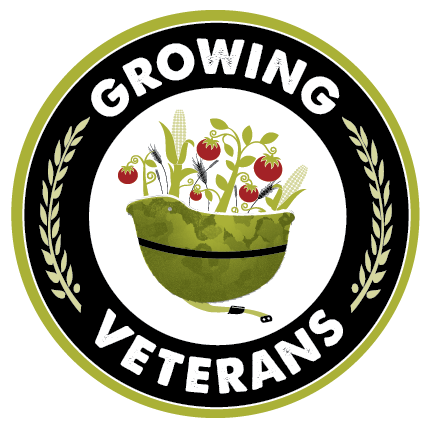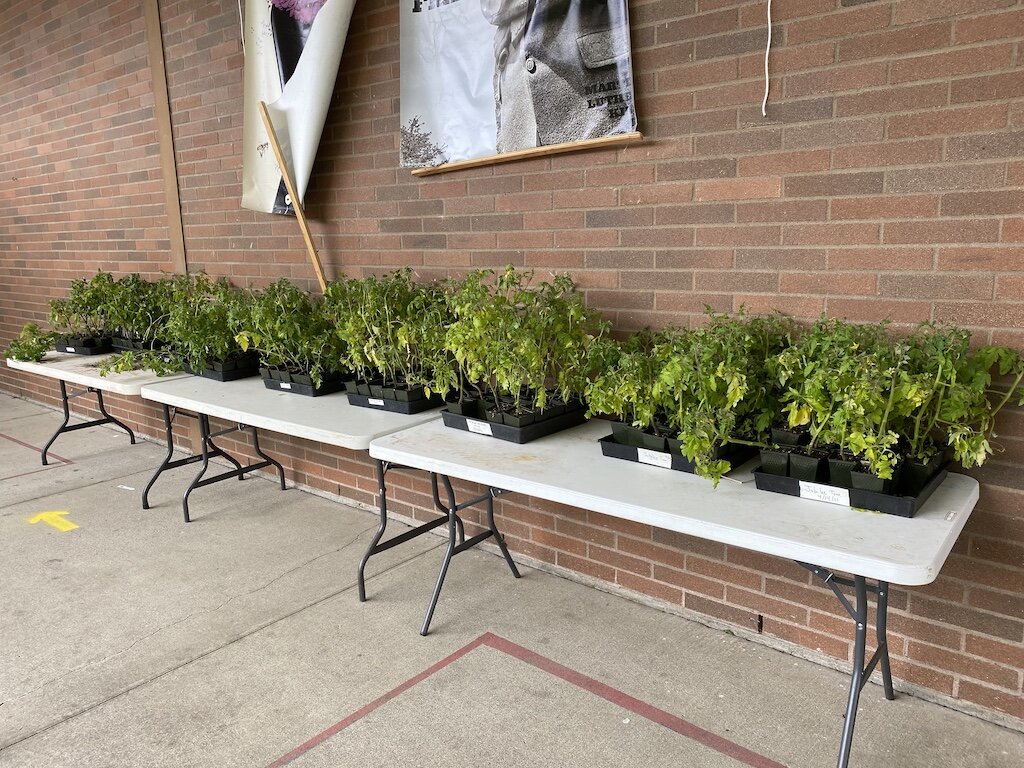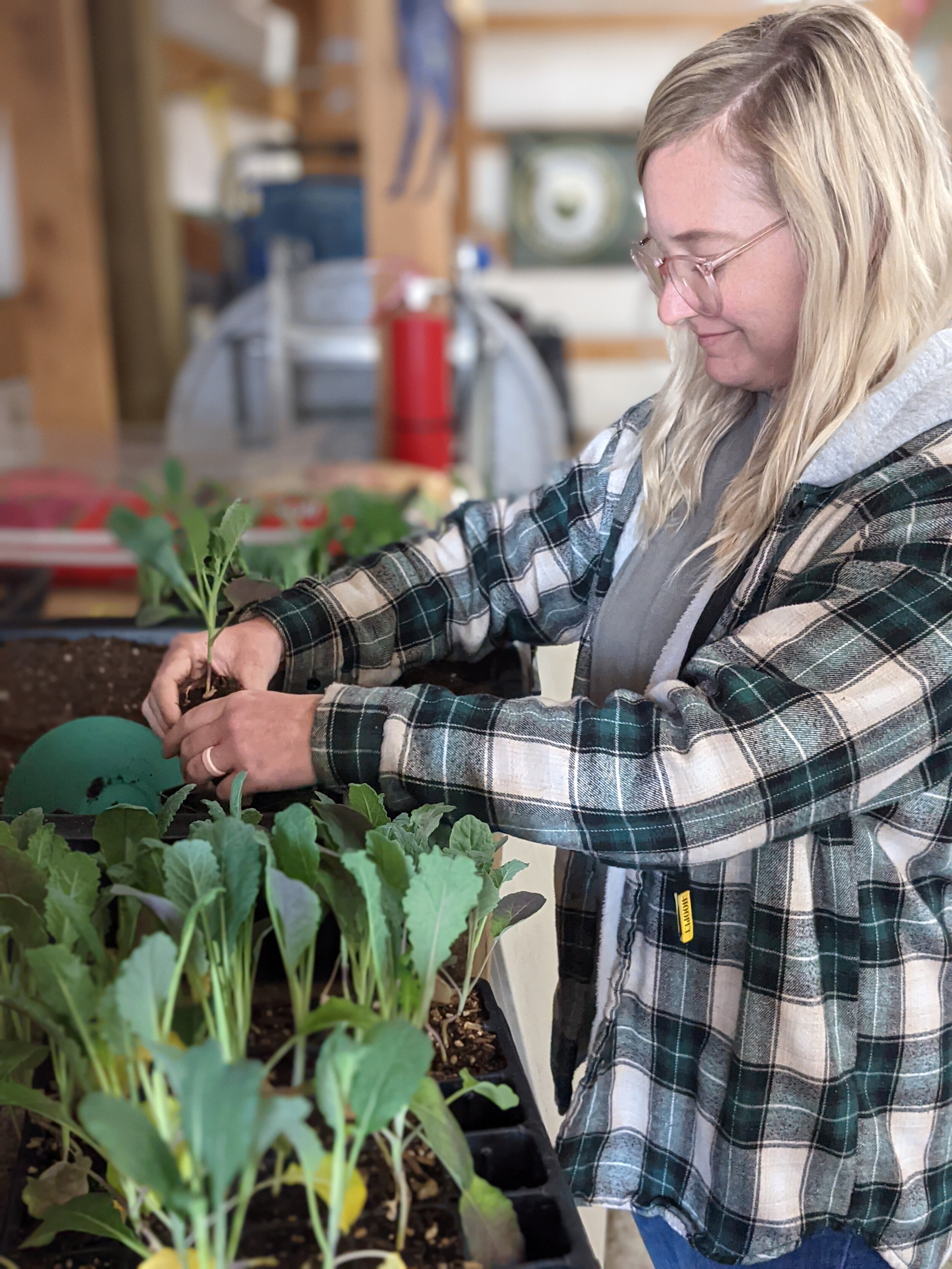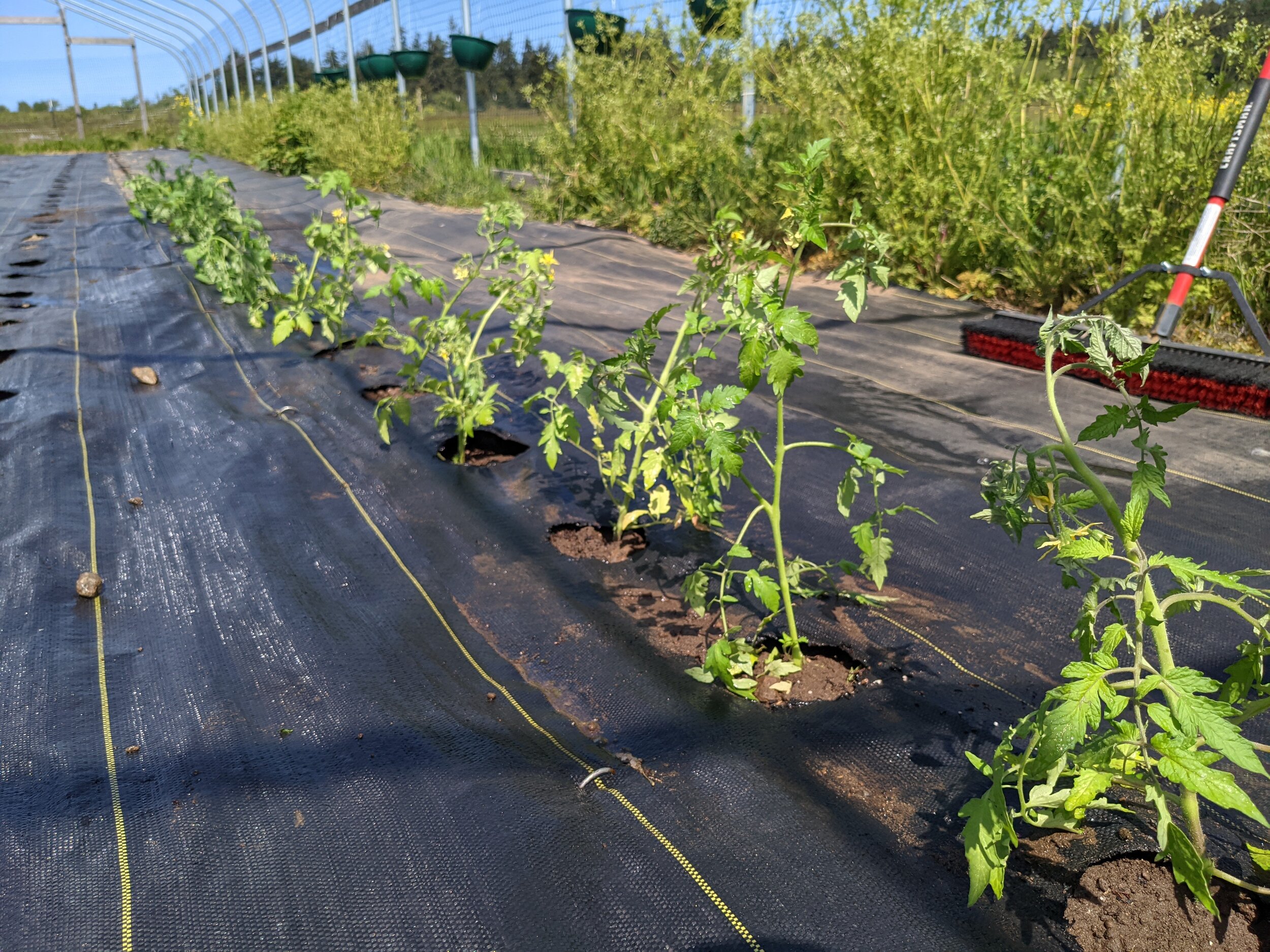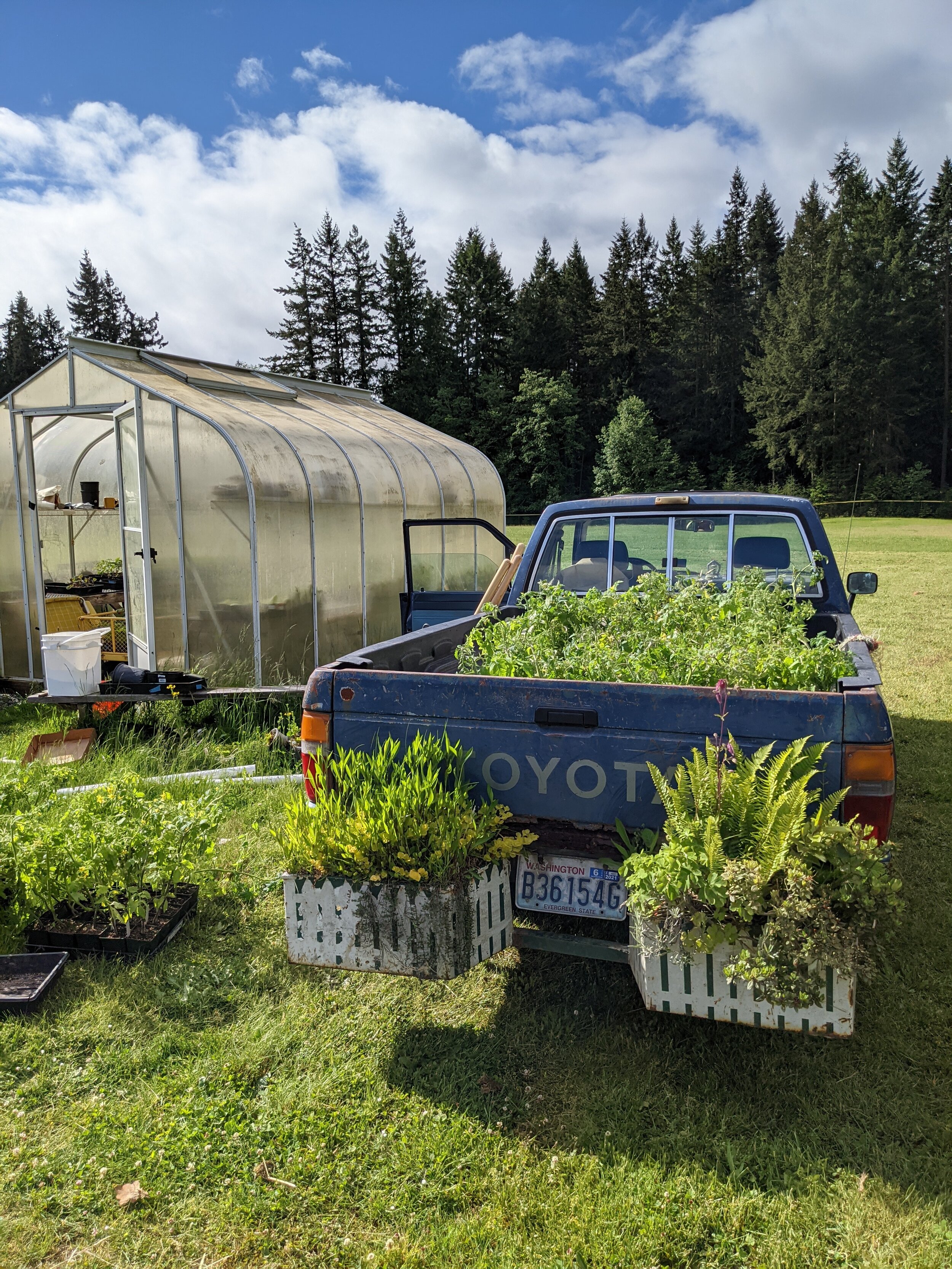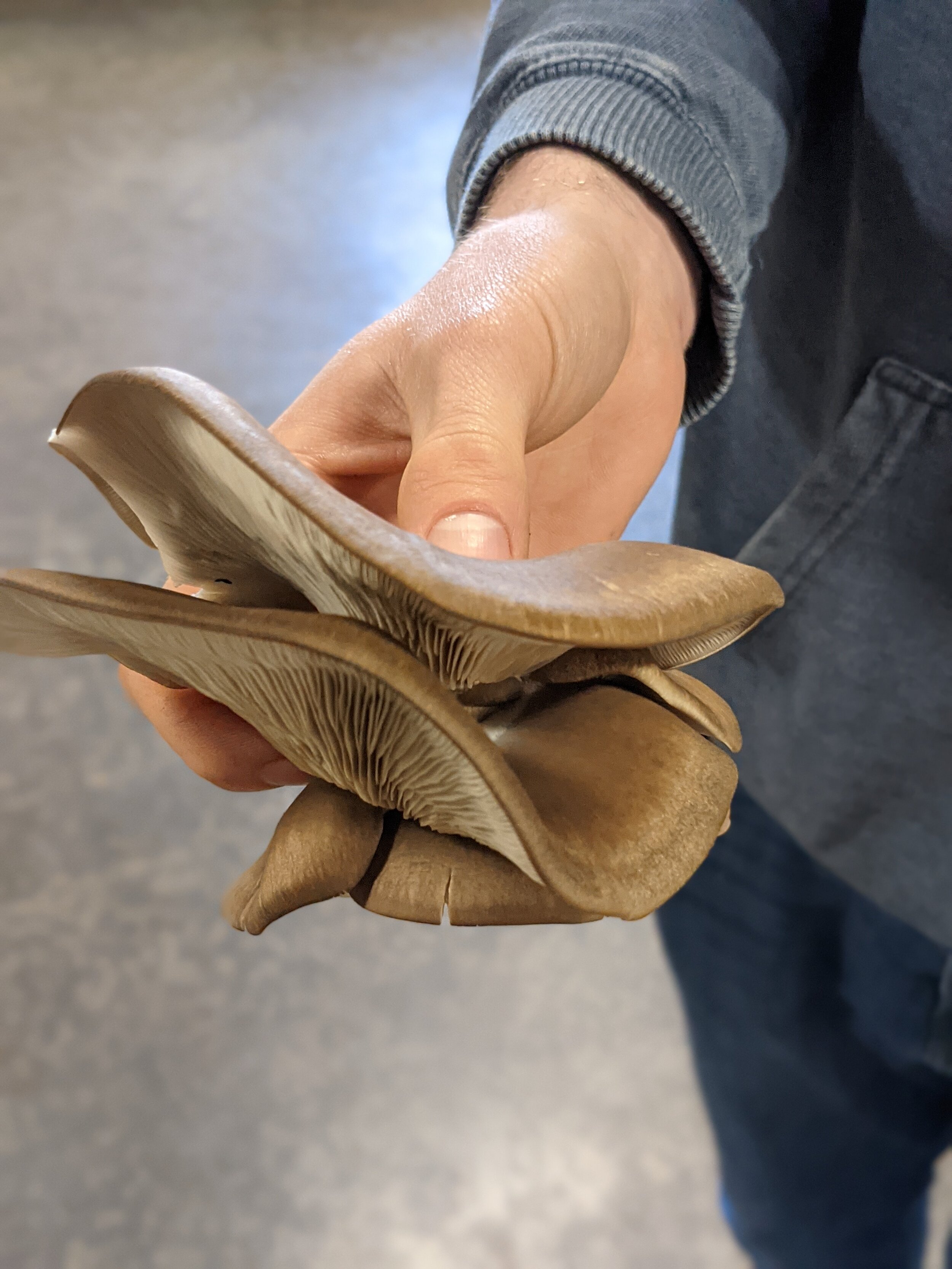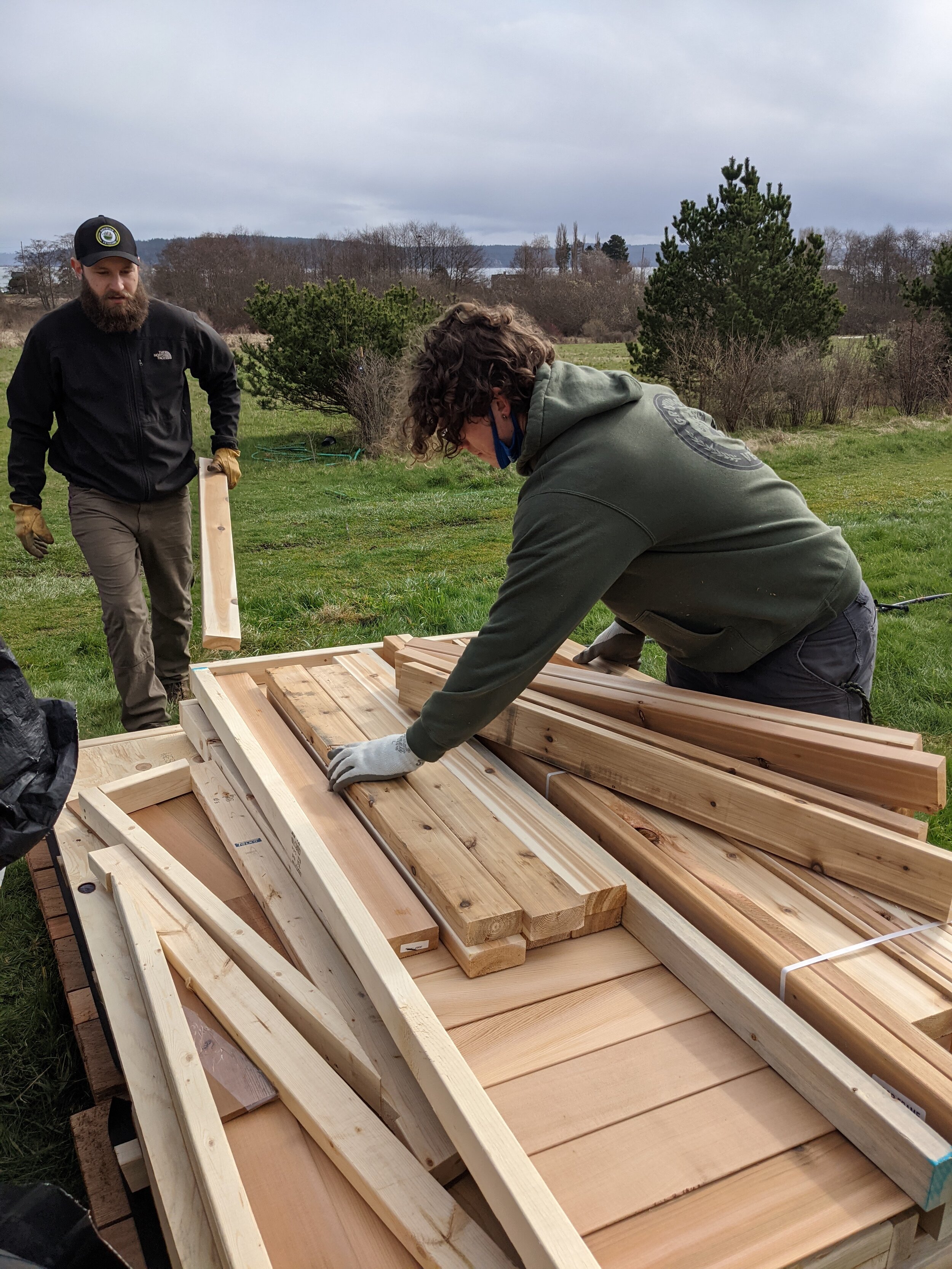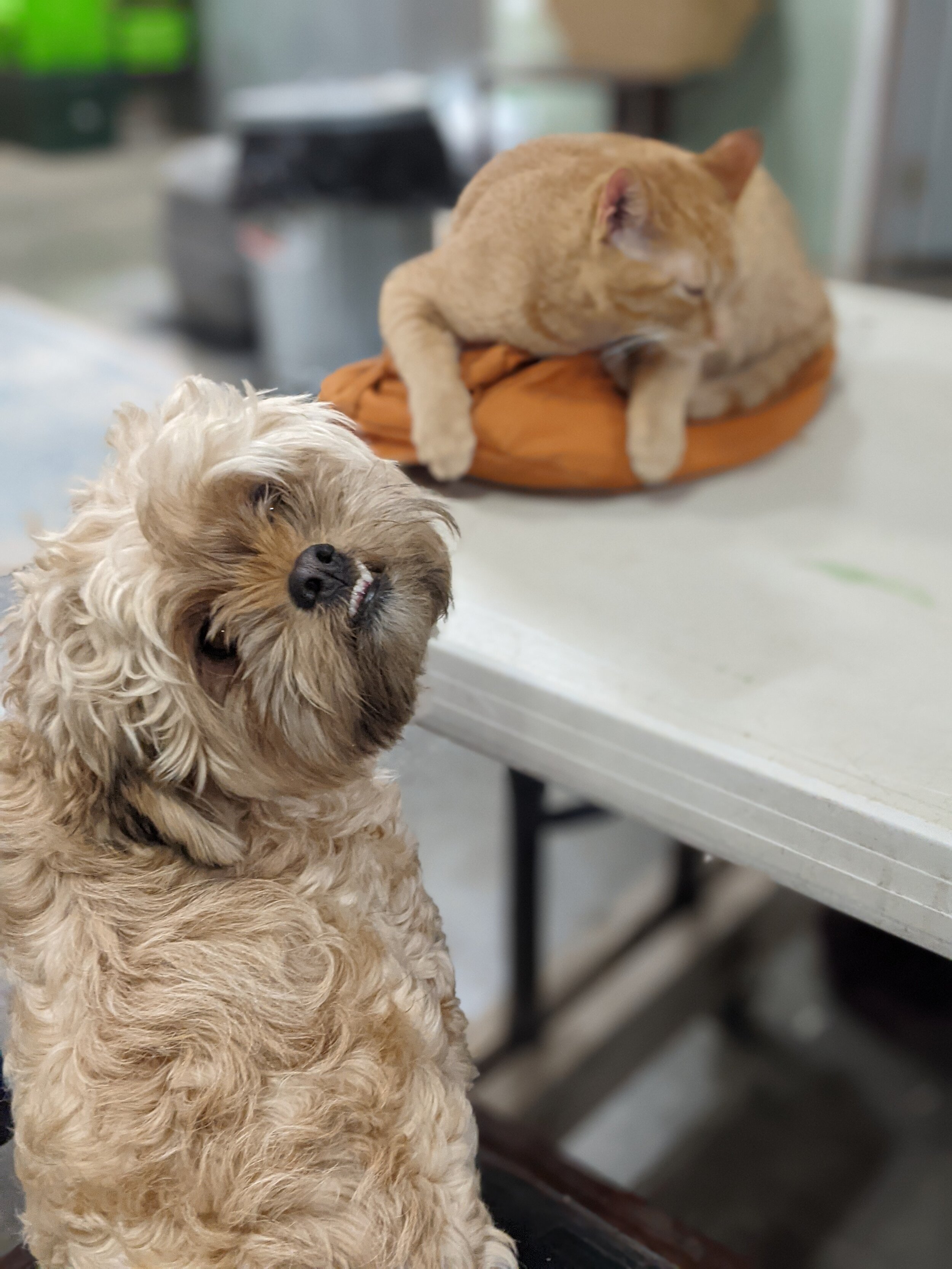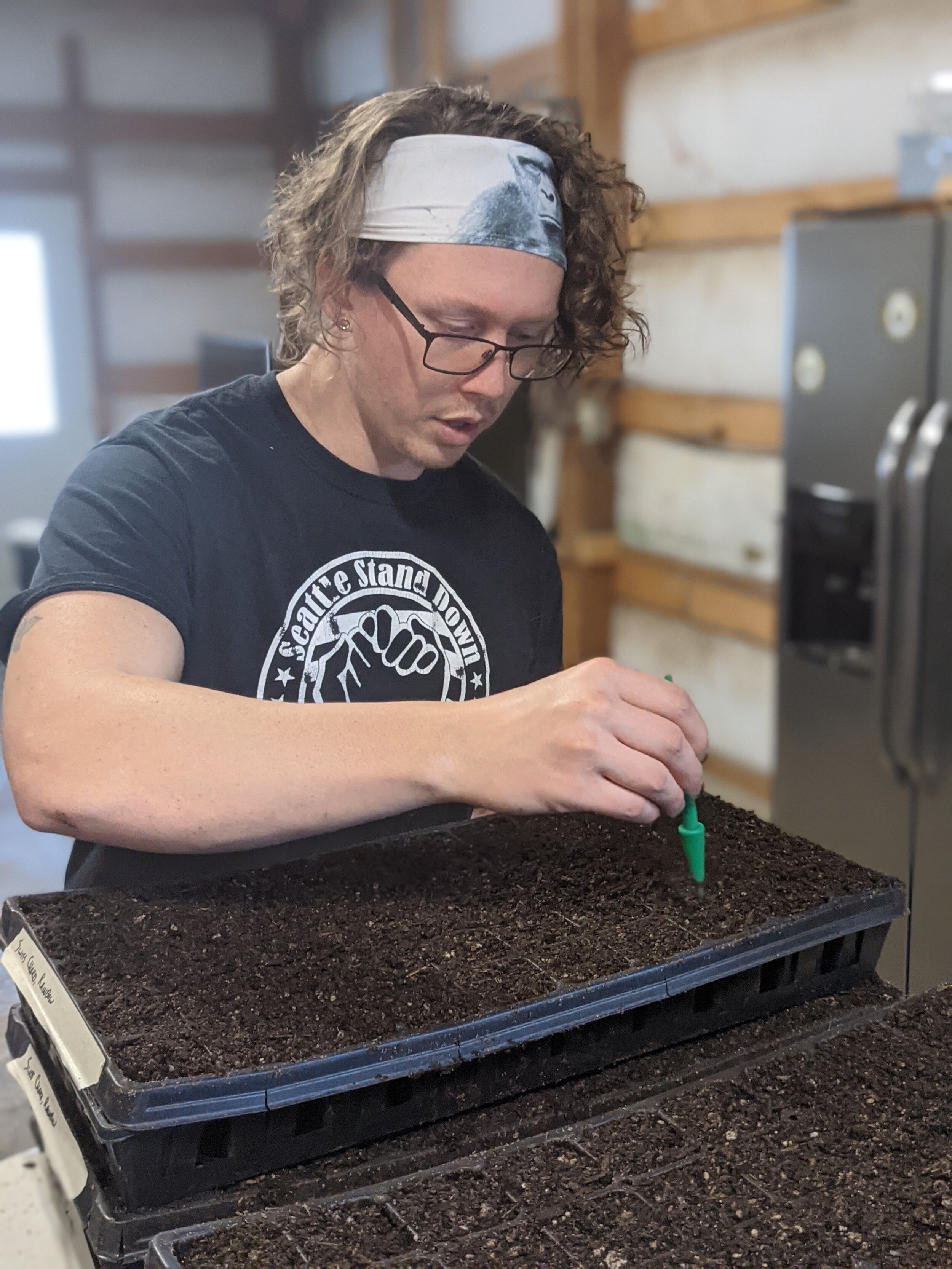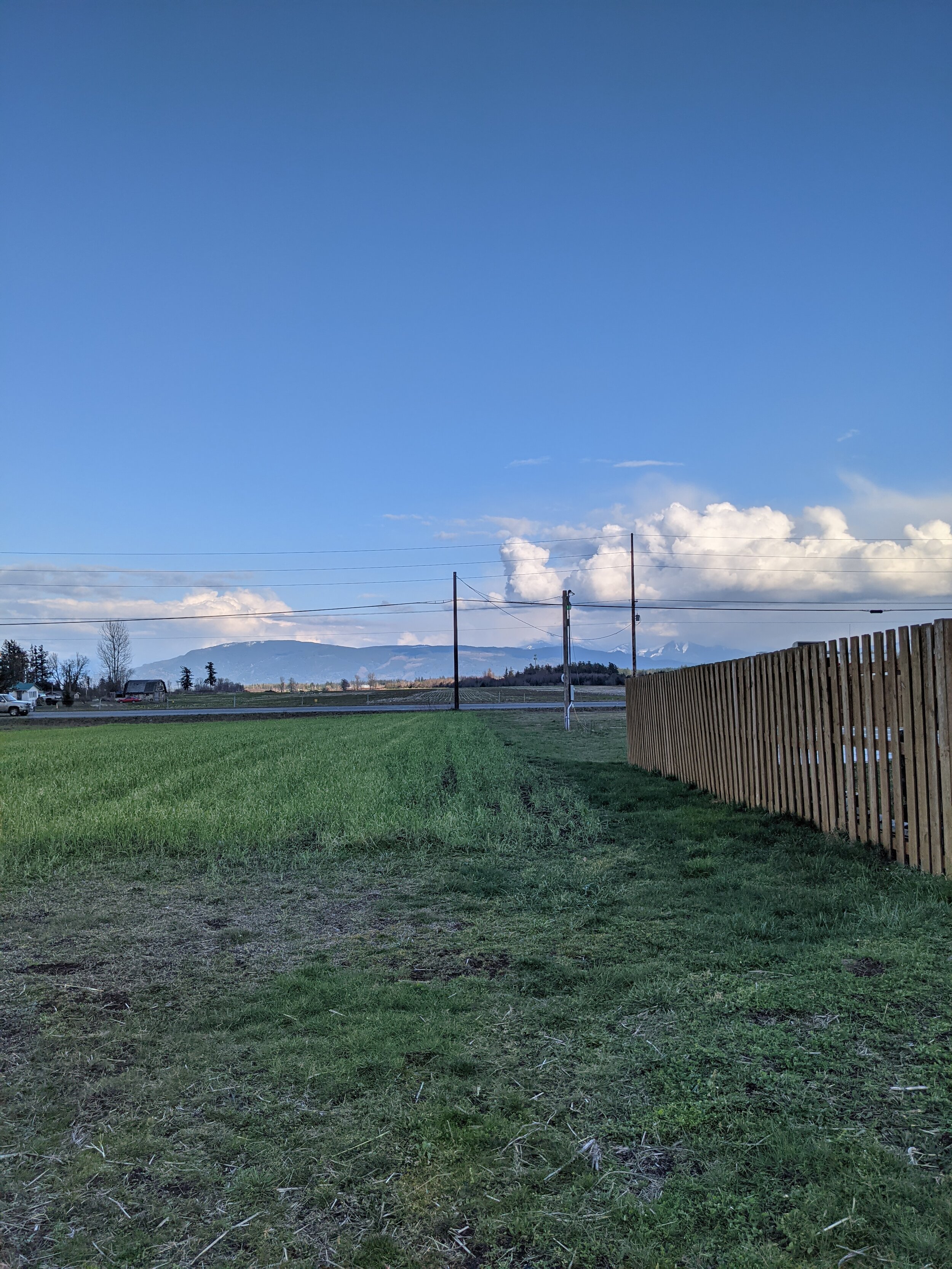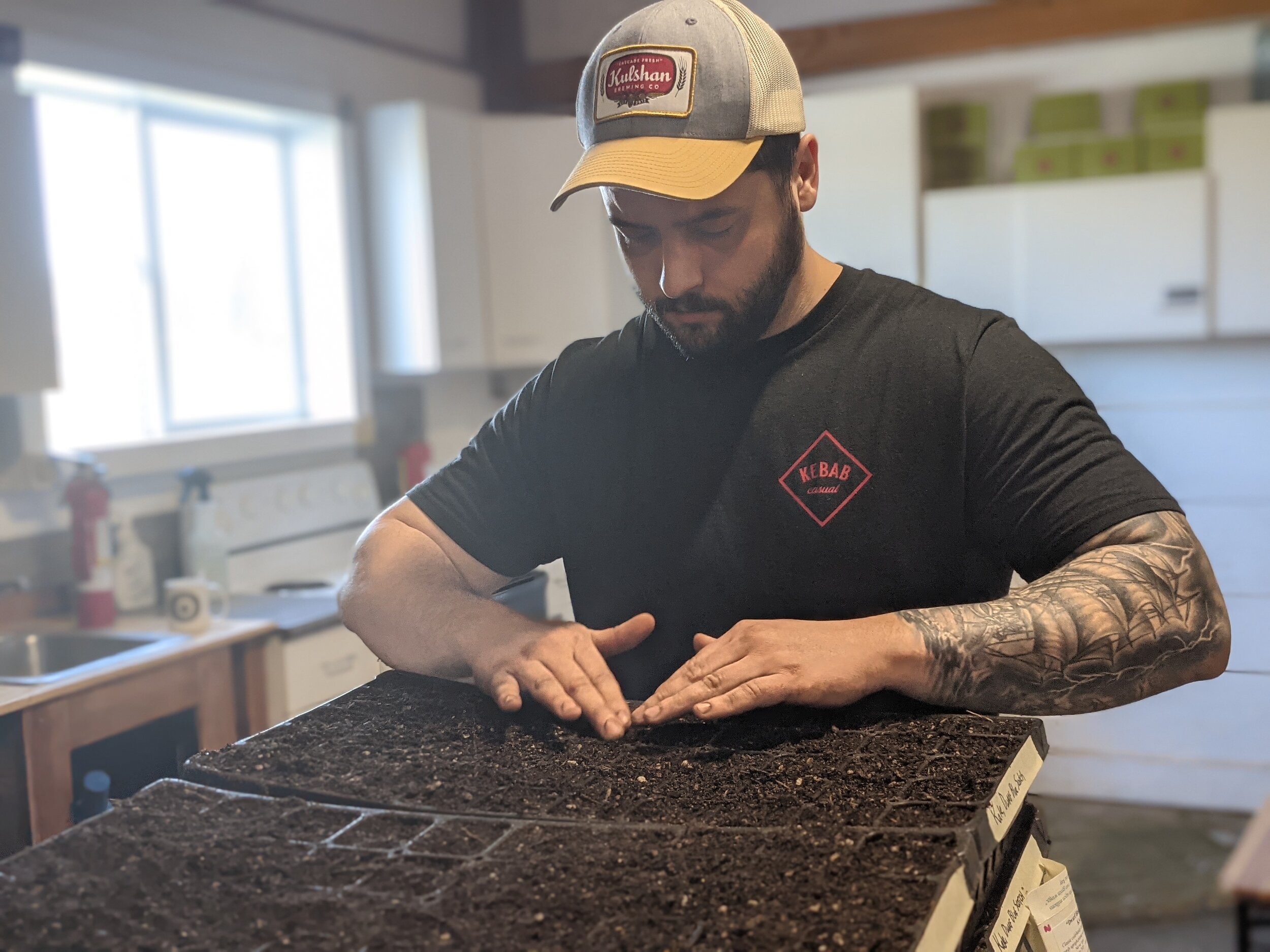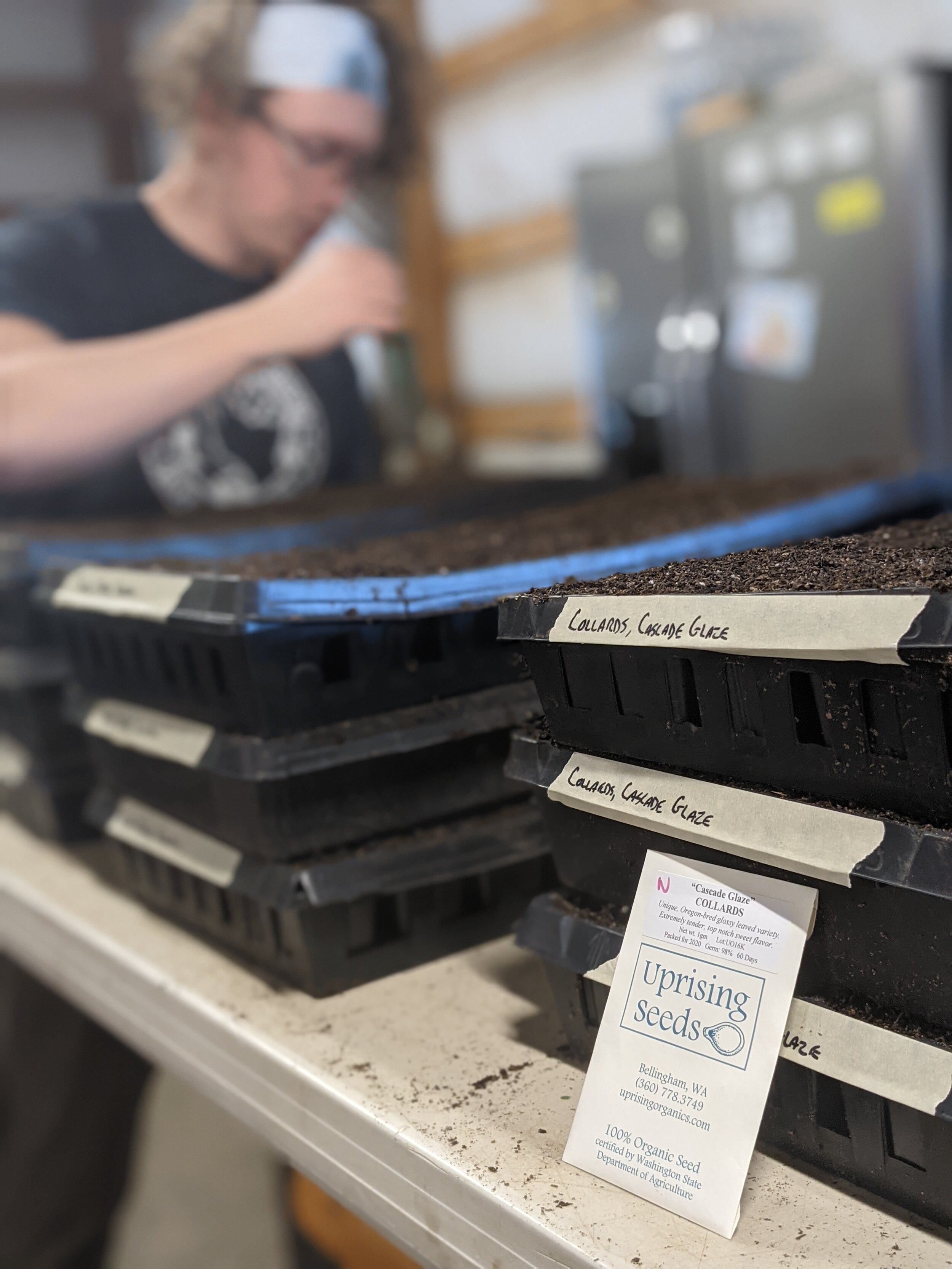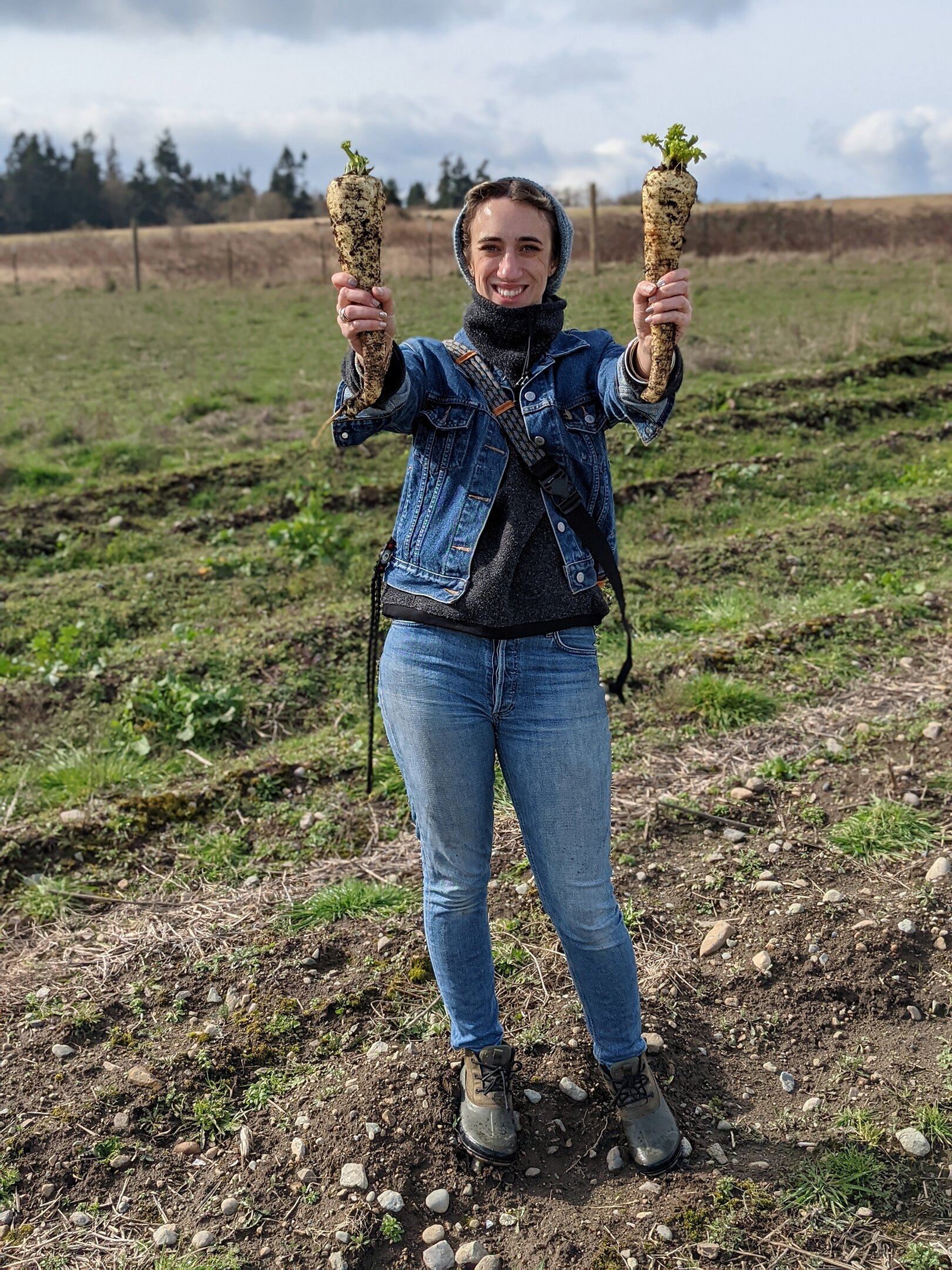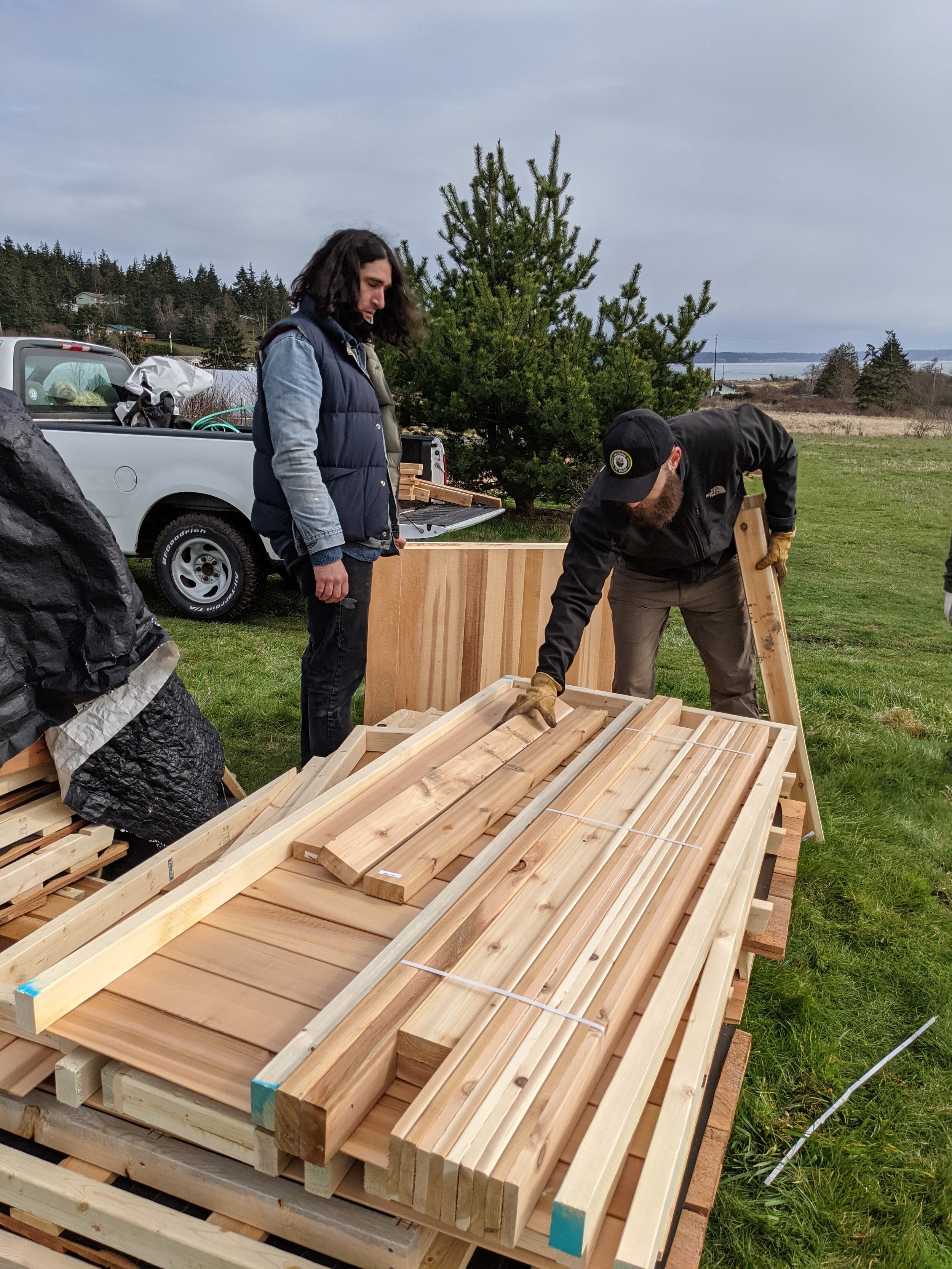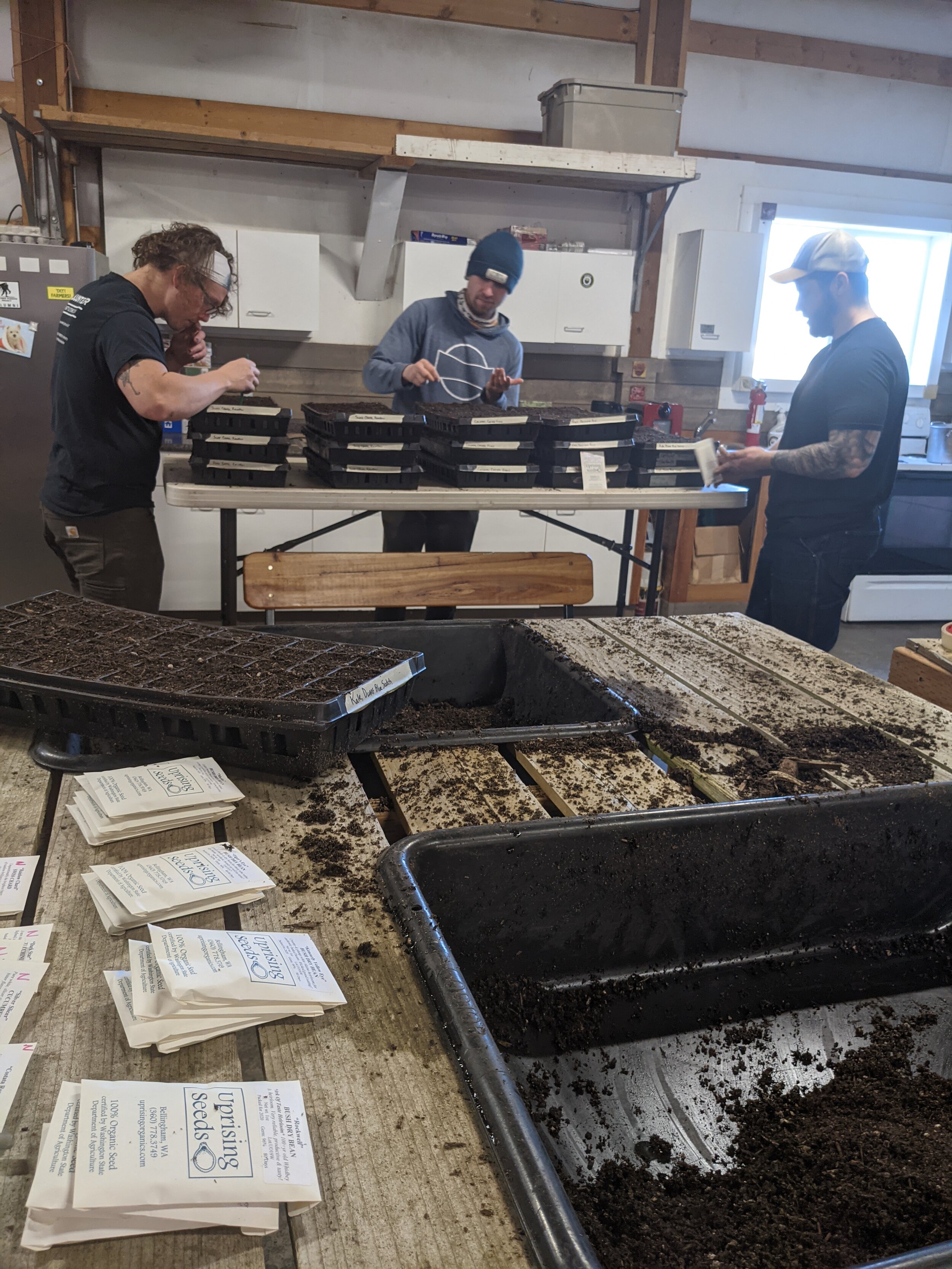Christy (USN), Western Washington University Work Study
In her own words, here is what Christy a recent work study participant had to share about her experience working on the farm at Growing Veterans, experiencing our dirt therapy program impacts first-hand:
“I only have positive things to say about my experience with Growing Veterans. I found the community to be diverse in the aspect that they bring both older and newer generations of veterans as well as friends and family members of the local community together, creating an environment tailored to all walks of life.
One of the most challenging aspects of my transition into the civilian world was the perception of isolation and not feeling like I had a place in society. Growing Veterans gave me a strong sense of community and belonging with kindness, caring, and a sense of purpose through hard work.
I have learned so much in such a short time, and I wish I was sticking around longer to soak up the wealth of knowledge available from the staff and volunteers. I hope programs like this expand across the nation because if anything could stop the growing numbers of depression and suicide amongst veterans and active-duty members, this would be it.”
We wish Christy the best in her future as she pursues her masters degree at Gonzaga University. Keep Growing!
For more information on becoming a student work-study participant please fill out a contact form or swing by the farm in person. We’re looking forward to meeting you.
Operation Tomato Drop
In late May Growing Veterans got the call from the manager at South Whidbey School District farm program that they were experiencing an increased need for donated plant starts from food instable community members looking to increase their self sufficiency through home gardening.
We were excited to answer that call with 200+ organic heirloom tomato starts grown by our dirt therapy program participants.
Fun with math: The average tomato plant can easily yield up to 20lbs of produce per plant. Meaning 200 tomato plants even at less than optimal conditions can produce 4,000+lbs of healthy produce adding to local food resiliency
Donated tomato plants were made possible with the support of seed donors:
-Uprising Seed Co
-Osborne Seed
-Seed Savers Exchange
-Baker Creek
-High Mowing Seed
Full Circle: the Growing Veterans Intern Experience
By Chris Bullis, USN
GV alumni & PST graduate
Veteran Conservation Corps Intern 2020-21
My time as an intern at Growing Veterans has changed my life in a very real way. Thanks to GV and the Veteran Conservation Corps, I’ve been able to follow a new direction in my life that I’ve been interested in since I left the Navy – farming. Not only that, but the way that I approach my life is not with the same emergent, anxious feelings that I had before I began my time here. I’ve learned a lot, and still want to learn more, particularly about working in agriculture and with my hands. Over the past six months, I’ve had the opportunity to focus on new passions that I find exciting and provide a sense of accomplishment to my day to day.
I’ve had the time to pursue personal projects, such as growing oyster mushrooms, as well as focusing heavily on my own mental health. I’ve been trained in peer support through Growing Veterans, and have learned how to most effectively apply an empathic ear not only to others, but to myself. Working at this farm brought an interesting parallel to mind, as the regular maintenance that is applied to keeping this non-profit running and growing produce is similar to the self-care that should be applied to my own well-being to keep myself in optimal shape – there are times that things pop up and need direct fixing, while many things require careful planning with a specific approach. I imagine that’s where they came up with the term “dirt therapy.” Working in agriculture requires a lot of planning, a lot of patience, and some luck. Sometimes, things happen that we cannot control (poor weather, for example). We have to make plans to combat these events, and try to mitigate losses as best as possible, but I cannot be expected to predict the future, or do more than the best I can with the tools at my disposal. I think that these lessons have helped me to hold myself accountable to my own part in what happens, while accepting events that I have no power over. As a musician, I have always felt a need to be perfect in my performance, and as a Navy Corpsman, I knew that if I made a mistake, deaths would be on my hands.
“Over the past 6 months, I’ve had the opportunity to focus on new passions that I find exciting & provide a sense of accomplishment to my day to day.”
-Chris Bullis
While interning at Growing Veterans, I had room to calm down. I was able to practice patience and mindfulness in a controlled setting, allowing myself the space to make mistakes and understanding that there are few dire repercussions to most mistakes or delays. I found that without this kind of pressure, I actually paid better attention to detail, made fewer mistakes, and found prioritization quite easy. Farming requires lots of attention to detail to be placed on doing the right thing and the right time, as well as times where you have to let things be and try to find other ways to spend time without messing with the plan you’ve enacted. I think that before coming here, I had difficulty in finding my way through life as a civilian, as there are no concrete plans – not the case at GV. Here, I became part of a mission, helped develop plans for the 2021 season, and became part of a community in which I felt valued, something I’ve not felt since leaving the Navy.
COVID-19 threw a wrench in the normal way things go here at Growing Veterans. The staff here have mentioned that normally there’s more people, more projects, and more work to be done. While it’s likely that people who have interned here before me have had a different experience, I’d say that I’ve learned a lot about finding my own motivations and desires to spend my time. I have frequently struggled with a feeling that one must check all these boxes in order to be successful and happy, that we are all on the same track, and that some are ahead while others are behind. With the extra time here, I’ve been able to attend the Farmer Veteran Coalition’s Annual Convention, learned how to grow mushrooms, and was able to contribute to something bigger than myself. I think that my time here has helped me realize that there are many tracks that go at whatever speed I need, and that I have many options in front of me that bring me satisfaction without sacrificing my mental health. Not only that, but I think that GV gave some people an appropriate outlet for their own free time – working outdoors gave us an opportunity to allow some volunteers an escape from the extreme isolation that many people have felt in the course of the past year. Veterans tend to have a unique perspective toward isolation upon leaving the military, and I think a lot of the people who were able to come out this year appreciated being able to relate in their own way, particularly those who work from home in quarantine.
“I can say with absolute certainty that I have an improved outlook on the world since beginning my internship last year, & am thankful to everybody who makes this program possible…”
-Chris Bullis
Prior to my internship at GV, I had absolutely no experience in agriculture, and a limited understanding of growing produce. Over the past six months, I’ve been taught how to till, seed plants, make a seasonal farm plan, and operate a tractor. I’ve learned about different types of produce and the different treatment they need to grow well, and had the time and space to have my own projects I could never sustain in my apartment. I’ve seen how the farm develops relationships with local businesses to produce a final product, whether it was hot sauce, beer, or salves, and planning the farm according to what relationships it was decided we would invest in. I’ve learned about different programs that farmers can get involved in, such as the Farmer Veterans Coalition, and the different resources that such affiliation can provide. With all this experience, I’ve decided to further my education in agriculture by attending the Viva Farms Organic Farming Practicum, and in the next couple weeks, I will be working full-time at a for-profit organic farm in Mount Vernon.
Sean, Angela, Tonneli, Garrett, Jared, and every volunteer at Growing Veterans have given me a place that I am proud to have been a part of, and I intend to continue volunteering at GV as often as my future schedules allow. I really can’t overstate how big of an impact this place has had on me. I can say with absolute certainty that I have an improved outlook on the world since beginning my internship last year, and am thankful to everybody who makes this program possible. Thanks for the good times GV.
March Farm Updates
Spring has sprung here at the farm and we are excited to share all the great things we have been working on since our last newsletter!
On The Farm
Seed Share Campaign: In an effort to both build community with our neighbors who may still be unable to volunteer in-person & address the continuing hunger crisis, this February Growing Veterans sprung into action with an all new idea:
“What if instead of requiring veteran farmers to come to us? We came to them?”
Thus our Seed Share was born! Over the last month our veteran interns packed over 100 seed kits, sent to 21 states across America! All seed share recipients are welcomed to our community of growers and encouraged to share both their seed starting journey via social media using #growingveterans and in actual harvest yields. to find a food bank near you able to accept fresh produce, click here
Seed Starting Crops: At the Lynden Farm seed starting is in full swing! Farm plans have been set & the annual plant sale starts are taking root. Thanks to our seed donation partners here locally Uprising Seed co. of Bellingham WA & Osbourne Seed co. of Mt. Vernon WA we have been able to accommodate big dreams of giving more! This year we have set a goal of doubling our 2020 food bank donations, increasing our projected yields of organic peppers, squash, cucumbers, greens, & legumes.
In The Community
Library of Congress: We are excited to announce our virtual debut of our Executive Director Sean Dalgarn’s panel discussion for the Library of Congress veteran history series titled “Veteran Grown: Urban Farming” this Friday, March 19th at 3pm PST: watch by clicking here
No Hop Left Behind Beer Fundraiser: With the generous support Terramar Brewstillery Bow, WA we were able to raise over $1,100 from sales of their No Hop Left Behind beer, brewed with Growing Veterans organic hops. Show this great local business you care by stopping in and showing some love! Excellent seasonal menu items, rotating taps, outdoor & indoor seating available.
Undercover Pottery Show: In February Bellingham shop & gallery, the Good Earth Pottery store debuted their feature show: “Undercover” highlighting artful handmade butter dishes from across the USA. 10% of all sales from this show were donated directly to Growing Veterans in support of our vision to end the isolation that causes veteran suicide. Thank you to Good Earth & all the talented artists who participated!
Seed Starting Basics
New to Growing your own food, or perhaps just looking for new tips? Read the Growing Veterans seed starting guide for tips on growing all our favorite NW crops right at home.
Tomato, Pepper, Tomatillo, & Eggplant
Sowing: Start indoors, using a heat mat recommended. Sow seeds in early spring, 1/4 in. deep in well-drained soil in shallow flats. Keep soil 75-85 F for good germination. Careful: Overwatering can cause seeds to rot. When your first true leaf appears we recommend running a small fan on low over plants to begin strengthening. Moving starts outside: gradually expose any seedlings you start to the sun & outdoors. Increase exposure for several days. Start with 1-2hrs, then increase time to a full day over 1 wk. Protect young plants from harsh winds/heavy rain.
Pro Tip: Pinching off 1st blooms of plants will result in stronger plants, producing more fruit!
Squash
Sowing: These can be started indoors, but we prefer outdoors. When danger of frost has passed, create mounds of soil- in each, plant 3-5 seeds 1in deep. Space mounds 4ft apart after all danger of frost has passed. Squash can also be started indoors 3-4 wks before the last frost. Moving starts outside: gradually expose any seedlings you start to the sun & outdoors. Increase exposure for a period of several days. Start with 1-2 hrs, then increase time to a full day over a week. Protect young plants from harsh winds/heavy rain.
Lettuce & Salad
Sowing: When frost has passed, direct seed lettuce into rows or a round container to grow a living "salad bowl", space seeds 2in apart & rows 1ft apart. Cover seeds with a thin layer of soil.
Pro tip: As a rule lettuce does not like heat, in for lettuce looks like it is beginning to grow flowers it’s a good sign your season in over. Lettuce can be harvested all at once by the head, or leaf by leaf- taking only what you need for a longer lasting harvest
Corn
Sowing: Sow outdoors 2 wks after last frost... as soon as possible. Ground can be warmed by a black plastic cover seeds can be planted through holes in the plastic for extra warmth. A couple weeks after planting your first round of corn, plant another crop to extend the harvest.
Pro tip: Small plots of corn grows best in blocks instead of rows to encourage pollination.
Cucumber
Sowing: Using cell trays & a heat mat if available, sow indoors in mid-spring. Plant seeds a .5in deep, transplant outdoors in early summer 1ft apart. Cucumbers are 90% water, & love moist soil!
Pro Tip: Growing cucumbers up a trellis or fence can be a great way to keep bugs & other pests away from your fruit, & bring vines up to the level where you'll see them before they can over ripen or become tough.
Garlic
Sowing: Plant cloves in fall or spring in a moderately dry place & forget. Harvest garlic scapes (flower buds) before blooming to encourage larger cloves.
Pro Tip: Garlic can be planted with roses as a companion plant to discourage bugs.
Beets
Sowing: We recommend sowing beets outdoors 2-3 wks before the last frost in spring & succession plant new seeds every 3 wks until June. Beets can again be planted in late summer or early. Harvest after 45 to 65 days.
Pro Tip: Beets are excellent for eating raw or cooked, both greens & roots can be enjoyed. Our Food bank always especially looks forward to beet donations!
Kale
Sowing: Direct sow or transplant as soon as soil is 45°. Seeding depth: ¼”. When starting indoors, transplant at 12-18” space plants 1.5-2ft apart (less for baby kale or micro greens).
Carrots
Sowing: We like planting our carrots in mounded rows. Sow directly outdoors in late spring, carrots do not transplant well. Space seed shallowly ¼-½” apart.
Pro Tip: for best results keep soil very moist during germination & laying damp newspaper over rows until sprouts emerge. For even better carrots, cover their "shoulders" emerging from the soil with a thin layer of fresh dirt if showing above ground.
Melon
Sowing: Start indoors in early spring, plant 1 seed per cell in trays, heat mat recommended. Move outside in early summer. Melons like heat & water, for best results grow on black plastic to increase soil heat. When fruit forms wait until the vine connecting the fruit to the plant begins to turn brown (this is great way to ensure you have not harvested too early)
Pro Tip: Try growing your melon "from the bag" Gardeners with poor conditions often have a tough time getting melons to fruit. Purchase a 10-pound bag of organic compost & lay on the ground in full sun. Slice a square off the top of the bag, leaving a flat, mini container that will hold moisture great & get roots toasty hot! In the bag sow 3-4 melon seeds-watering regularly. Prepare for the best melons of your life!
Basil
Sowing: Sow basil seeds indoors 3 wks before the last frost, use a cell tray with a few seeds per cell. Basil is a warm weather plant. Keep the soil moist. Pinch out the center of mature basil plants where flowers form every few weeks to encourage new leaf growth, don't be afraid to prune heavily.
Pro Tip: Basil plants need to be “hardened off” before moving outside (this is why those living basil plants from the produce section die so fast). Accustom plants to weather by moving them to a protected place outside for a week during the day before planting outdoors.
3 Sisters
Sowing: Sow in late spring. In large mounds outdoors plant 3-5 corn seeds 4 in apart. When corn is 4in tall, plant 1 bean at the base of each corn plant. As beans emerge train them up corn. 2-3 wks after planting beans, sow 4-6 squash seeds around the sloping top sides of the mound. Train squash plants to shade the mound.
Pro Tip: For an extra boost consider fertilizing the traditional way. Bury food waste such as fish heads in the base of your mound before sowing seeds.
Leeks, Onions
Sowing: In winter start indoors in a large tray. Broadcast seed evenly throughout tray, cover lightly with soil, & keep moist. When sprouts begin to look like lush grass, separate each plant & transplant outdoors. transplant 6in apart in rows. Transplants will first look distressed after planting but quickly recover after 24-48 hrs. Onions & leeks are generally cold hardy but appreciate some hardening off.
Pro Tip: Before transplanting onions when seedlings are 3-4 inches long trim the (edible) tops of plants to encourage growth.
Farm Log #01
Stay tuned for an all new farm blog updated weekly by our veteran interns
Stay tuned for an all new farm blog powered by our veteran interns
step into the daily life of our program participants. Share in the joy & frustrations of farming.
In this blog you will get to learn about everything from sowing seeds & repairing drip lines to our favorite experiments like growing our own mushrooms!
